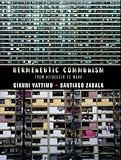Hermeneutic Communism : From Heidegger to Marx / Gianni Vattimo, Santiago Zabala.
Material type: TextSeries: Insurrections: Critical Studies in Religion, Politics, and CulturePublisher: New York, NY : Columbia University Press, [2011]Copyright date: ©2011Description: 1 online resource (264 p.)Content type:
TextSeries: Insurrections: Critical Studies in Religion, Politics, and CulturePublisher: New York, NY : Columbia University Press, [2011]Copyright date: ©2011Description: 1 online resource (264 p.)Content type: - 9780231158039
- 9780231528078
- HX73 .V385 2011
- online - DeGruyter
- Issued also in print.
| Item type | Current library | Call number | URL | Status | Notes | Barcode | |
|---|---|---|---|---|---|---|---|
 eBook
eBook
|
Biblioteca "Angelicum" Pont. Univ. S.Tommaso d'Aquino Nuvola online | online - DeGruyter (Browse shelf(Opens below)) | Online access | Not for loan (Accesso limitato) | Accesso per gli utenti autorizzati / Access for authorized users | (dgr)9780231528078 |
Frontmatter -- Contents -- Acknowledgments -- Introduction -- Part I. Framed Democracy -- 1. Imposing Descriptions -- 2. Armed Capitalism -- Part II. Hermeneutic Communism -- 3. Interpretation as Anarchy -- 4. Hermeneutic Communism -- Notes -- Bibliography -- Index
restricted access online access with authorization star
http://purl.org/coar/access_right/c_16ec
Having lost much of its political clout and theoretical power, communism no longer represents an appealing alternative to capitalism. In its original Marxist formulation, communism promised an ideal of development, but only through a logic of war, and while a number of reformist governments still promote this ideology, their legitimacy has steadily declined since the fall of the Berlin wall. Separating communism from its metaphysical foundations, which include an abiding faith in the immutable laws of history and an almost holy conception of the proletariat, Gianni Vattimo and Santiago Zabala recast Marx's theories at a time when capitalism's metaphysical moorings-in technology, empire, and industrialization-are buckling. While Michael Hardt and Antonio Negri call for a return of the revolutionary left, Vattimo and Zabala fear this would lead only to more violence and failed political policy. Instead, they adopt an antifoundationalist stance drawn from the hermeneutic thought of Martin Heidegger, Jacques Derrida, and Richard Rorty.Hermeneutic communism leaves aside the ideal of development and the general call for revolution; it relies on interpretation rather than truth and proves more flexible in different contexts. Hermeneutic communism motivates a resistance to capitalism's inequalities yet intervenes against violence and authoritarianism by emphasizing the interpretative nature of truth. Paralleling Vattimo and Zabala's well-known work on the weakening of religion, Hermeneutic Communism realizes the fully transformational, politically effective potential of Marxist thought.
Issued also in print.
Mode of access: Internet via World Wide Web.
In English.
Description based on online resource; title from PDF title page (publisher's Web site, viewed 02. Mrz 2022)


